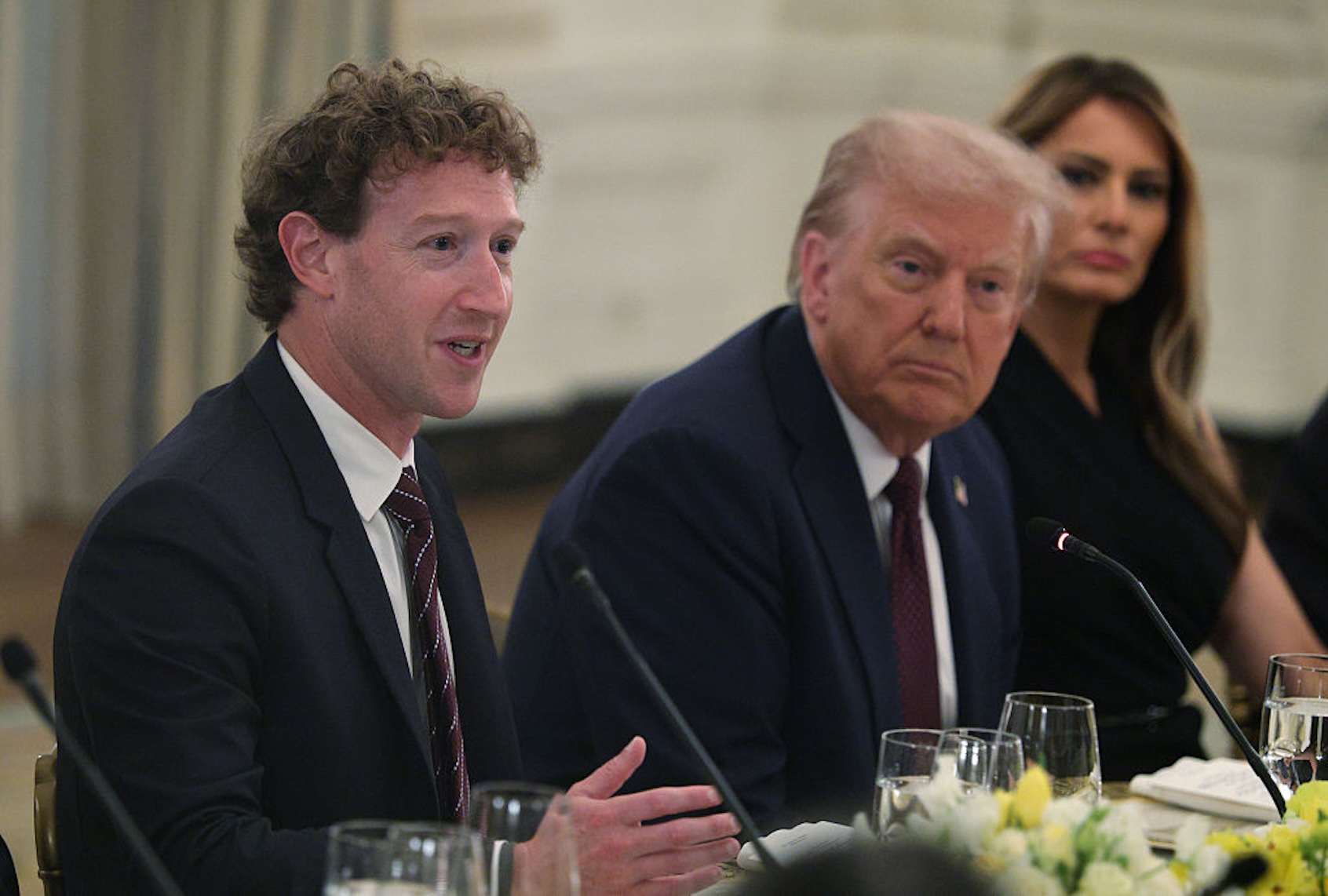It’s been a troubling year of coincidences for Meta CEO Mark Zuckerberg.
The social media magnate announced in January that the company, which owns Facebook and Instagram, would implement a startling fact-checking shutdown in the United States, as well as rollbacks to its hate speech policy worldwide. President Donald Trump’s election to a second term, Zuckerberg said, was “a cultural tipping point towards once again prioritizing speech,” and he equated basic content moderation efforts to “censorship.” Zuckerberg also repeated talking points favored by Trump, who would be inaugurated later that month (and whose inaugural fund would go on to receive $1 million from Meta).
“After Trump first got elected in 2016, the legacy media wrote nonstop about how misinformation was a threat to democracy,” Zuckerberg said. “We tried in good faith to address those concerns without becoming the arbiters of truth. But the fact checkers have just been too politically biased and have destroyed more trust than they’ve created, especially in the U.S.”
Fast forward to July, when Meta revealed a set of new and largely symbolic teen safety features. The announcement came after months of criticism for endangering its users and only days after the company received a petition signed by 136,000 users and more than 40 organizations demanding that it restore protections on its platforms.
Under Trump, Zuckerberg and Meta’s leadership have kept to a crystal clear political message: They are willing to acquiesce to political powers that could benefit them monetarily at the expense of information integrity and objectivity.
The truth here, of course, is that there is no coincidence in either announcement. Under Trump, Zuckerberg and Meta’s leadership have kept to a crystal clear political message: They are willing to acquiesce to political powers that could benefit them monetarily at the expense of information integrity and objectivity. It’s only when everyday people kick up enough fuss that they attempt to save face.
My organization, UltraViolet, has been one of the leaders in the campaign to hold Meta accountable for its total abdication of the duty to protect users on its platform. We’ve called them out at every turn and even projected lights onto Zuckerberg’s D.C. mansion in protest. What Meta refuses to accept is that their policies are actively hurting people.
In June, UltraViolet, along with the LGBTQ rights organizations All Out and GLAAD, released a report and companion site called Make Meta Safe that revealed the adverse real-world impacts of Meta’s U.S. fact-checking shutdown and hate speech policy rollbacks. Based on a survey of 7,000 active users across Facebook, Instagram and Threads (primarily women and LGBTQ people), the report found that not only did 92% of vulnerable users feel far less safe online, but they were also censoring themselves out of fear of expressing themselves — a great irony given that Zuckerberg’s justification for the rollbacks was free expression. If Meta were sincere in its claims of taking user speech and safety seriously, it would do something about issues like these.
Want more sharp takes on politics? Sign up for our free newsletter, Standing Room Only, written by Amanda Marcotte, now also a weekly show on YouTube or wherever you get your podcasts.
Take, as another example, the new teen safety standards introduced on Facebook and Instagram that Meta has tried framing as bold and proactive. In reality, they are a bare minimum effort to meet existing laws banning child sexual abuse material.
Pull back the hood and you’ll find that these features — which include new safety features added to direct messages in Teen Accounts and new block-and-report options in direct messages, according to Meta — rely entirely on teens themselves to block and report sexual predators. It’s a deeply disturbing precedent to set, one that builds on the company’s continued lack of accountability, which drew legal action from 28 state attorneys general across the country looking to hold Meta liable for child exploitation and safety.
We need your help to stay independent
Since Trump returned to office in January, Zuckerberg and the company have barely paid lip service to the idea of protecting children. They have completely abandoned the work of fighting against hate speech directed towards women, people of color, trans people and more. In its updated policy, Meta now explicitly allows on its platforms dehumanizing statements including “Immigrants are grubby, filthy pieces of shit;” “Black people are more violent than Whites” and “gay people are mentally ill.”
This is bad enough, but now instead of these hateful statements being flagged by content moderators, the burden of blocking and reporting this harassment — much like with Meta’s updated approach to teen safety — falls to users on the receiving end of the abuse.
Rampant dehumanization doesn’t just lead to greater hate and harassment against adults. It contributes to an ecosystem of hate that makes it easier for predators to dehumanize and even abuse teens. And it’s why we’re calling Meta’s bluff on user safety.
Hate thrives where moderation dies.
Until the company proves that it’s serious about protecting its users, recent changes like the new teen safety features can only be viewed as a publicity stunt, not a step in the right direction.
Read more
about this topic


